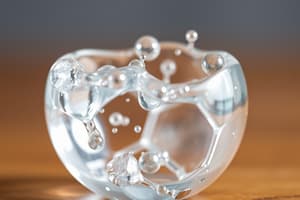Podcast
Questions and Answers
Which type of property is observed or measured without changing the nature of the matter?
Which type of property is observed or measured without changing the nature of the matter?
- Qualitative property
- Physical property (correct)
- Chemical property
- Quantitative property
Which type of property demonstrates the potential for making a new substance or describes how matter will interact?
Which type of property demonstrates the potential for making a new substance or describes how matter will interact?
- Qualitative property
- Physical property
- Chemical property (correct)
- Quantitative property
Which physical property indicates that a substance can be hammered into thin sheets, shaped, or molded without breaking?
Which physical property indicates that a substance can be hammered into thin sheets, shaped, or molded without breaking?
- Ductile
- Opaque
- Malleable (correct)
- Brittle
Which type of property helps classify and identify matter without fundamentally changing it?
Which type of property helps classify and identify matter without fundamentally changing it?
Which type of property describes how elements or compounds are likely to interact with one another to form new substances?
Which type of property describes how elements or compounds are likely to interact with one another to form new substances?
Which of the following is NOT one of the 7 base units in the SI system?
Which of the following is NOT one of the 7 base units in the SI system?
What was the main reason for creating the SI system?
What was the main reason for creating the SI system?
What were the original standards for the SI units based on?
What were the original standards for the SI units based on?
What has caused inconsistency in the SI units over time?
What has caused inconsistency in the SI units over time?
What have the standards for the SI units been changed to be based on?
What have the standards for the SI units been changed to be based on?
Flashcards are hidden until you start studying
Study Notes
Types of Properties
- Intensive property: observed or measured without changing the nature of the matter
- Extensive property: demonstrates the potential for making a new substance or describes how matter will interact
Physical Properties
- Malleability: indicates that a substance can be hammered into thin sheets, shaped, or molded without breaking
Properties for Classification
- Physical property: helps classify and identify matter without fundamentally changing it
- Chemical property: describes how elements or compounds are likely to interact with one another to form new substances
SI System
- The SI system does not include the calorie as one of its 7 base units
- The main reason for creating the SI system was to establish a consistent and standardized system of measurement
- The original standards for the SI units were based on physical objects, such as the meter being based on the length of a metal bar
- The use of physical objects as standards has caused inconsistency in the SI units over time
- The standards for the SI units have been changed to be based on fundamental physical constants, ensuring greater accuracy and consistency
Studying That Suits You
Use AI to generate personalized quizzes and flashcards to suit your learning preferences.




